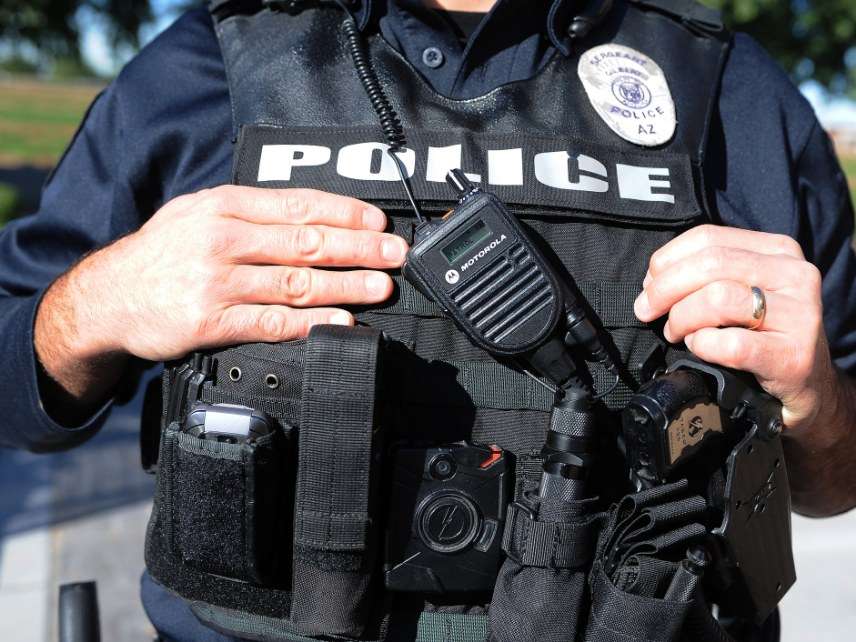California Lawmakers Vote to Give Citizens Access to Records About Police Misbehavior
State law keeps misconduct secret from the public. That may be about to change.

Californians may soon be able to learn when their police officers have been reprimanded or punished for serious misconduct.
Since the 1970s, the Golden State has kept police personnel records so secret that citizens were unable to find out if officers have previously gotten in trouble. This affected more than the average man on the street: Even prosecutors and defense attorneys had to fight to get relevant information about a police officer's conduct. In Los Angeles, for example, prosecutors are battling law enforcement unions to get the names of sheriff's deputies whose misconduct could potentially compromise and undermine court cases.
Last Friday, both the state Assembly and the state Senate passed SB 1421, a bill that would open up police personnel records to public scrutiny in several instances: if the officer was involved in an incident involving the discharge of his or her gun, if the officer was involved in an incident that lead to a person's death or great bodily injury, if the officer had been found to have engaged in sexual assault with a member of the public (and in the bill's definition, this covers any sexual act while on duty), and if the officer had been found to have engaged in dishonest practices, such as committing perjury, falsifying reports, or destroying or concealing evidence.
The bill includes investigative reports as well as audio, video, recorded interviews, and transcripts related to the incidents. The video component is particularly valuable, because there's also a bill—AB 748—making its way through the legislature that would amend state law to cover police body camera footage under the state's Public Records Act. Right now individual law enforcement agencies have been setting their own policies, with some simply asserting that the footage is not a public record. The Los Angeles Police Department initially said they would not be releasing body camera footage, but it reversed course and instituted a system for release earlier this year.
Under the new bill, police can withhold body camera footage for 45 days if its release could interfere with an investigation, and they can make a case for holding it longer if needed. The legislation also provides guidelines for redacting anything in the videos that would violate the privacy of a subject of a recording (the identity of a witness or victim, for example). Beyond these exceptions, AB 748 makes it clear that police body camera footage counts as a public record under state law.
The Los Angeles Times notes that Democratic Gov. Jerry Brown has not taken a position on either bill. It was Brown who signed the 1978 law creating the presumption of secrecy around police misconduct records—a reminder that in California, the police's power to protect themselves from public scrutiny doesn't depend on "tough on crime" Republicans being in charge.
Editor's Note: As of February 29, 2024, commenting privileges on reason.com posts are limited to Reason Plus subscribers. Past commenters are grandfathered in for a temporary period. Subscribe here to preserve your ability to comment. Your Reason Plus subscription also gives you an ad-free version of reason.com, along with full access to the digital edition and archives of Reason magazine. We request that comments be civil and on-topic. We do not moderate or assume any responsibility for comments, which are owned by the readers who post them. Comments do not represent the views of reason.com or Reason Foundation. We reserve the right to delete any comment and ban commenters for any reason at any time. Comments may only be edited within 5 minutes of posting. Report abuses.
Please to post comments


What punishment occurs if these bills pass and law enforcement fail to comply?
Brady list them all. Every patrolman, every forensic lab tech, every detective... If they're loosely affiliated with the non-compliant department, list them. You'd have 100% compliance pretty easily.
Extend that thought to all civil servants that includes elected officals then the whole state would comply!
re: alt-text... Now I've got this stuck in my head, Shackelfart. Thanks a lot.
Nice start but why didn't they include all assaults? So CA residents don't get to get rid of a shitty cop who attacks people until they rape or murder. I guess if they got rid of all the wife beaters in the department then you'd lose maybe upt o a quarter of the department .
California Lawmakers Vote to Give Citizens Access to Records About Police Misbehavior . . .
That sound like a good idea but it fall short of where it should be. The Lawmakers need to extend that access about misbehavior to all public servants.
"servants"